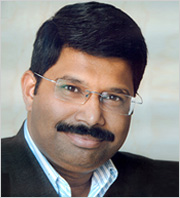
In our series on MBA entrance exams, MBAUniverse.com brings this article from CET 07 Topper - Shreyash Shah on 'How to do well in CET'. Shreyash is currently a MMS-Ist year student at Mumbai based Jamnalal Bajaj Institute of Management Studies.
Read on for the tips from the topper.
"The MAH – MBA CET is one of the most sought after entrance exams to gain admission to the top B – Schools in Maharashtra. 60,000 students, working professionals tried their hand at this entrance test in order to make their way to the top B – schools in Maharashtra. It consists of 200 questions to be solved in two and a half hours. These questions are from various topics and genres including Problem solving, Logical Reasoning, Data Sufficiency, Verbal Ability, Reading Comprehension and Visual Reasoning. As is evident, it is a test which focuses completely on SPEED and ACCURACY. These two are the most important factors that one must consider at all times; during preparation as well as while writing the test.
Preparation for a speed-based exam, the likes of CET, FMS, SNAP, NMAT, etc is quite different from the preparation for an "Application - based exam" like the CAT/XAT. It really helps if one has his basics sorted. Being quick with calculations really puts you ahead of the others as far as the CET is concerned (and NO...VEDIC MATHS ISN'T NECESSARY OR SUFFICIENT). While preparing for this test, it is important that one focuses on the underlying concepts and their meanings rather than just concentrating on the procedure to solve the questions. Procedures to solve problems will just increase the time taken to solve a particular question. If u can "question" the procedure and understand it, then u can definitely skip a substantial number of steps to solve a problem which is very instrumental in developing your speed.
Another issue that needs to be addressed is that one need not slog it out to prepare for these tests. Remember that the quality of the time you put in is more important than the quantity of time you put in. For example, one doesn't need to put in 5-8 hrs a day to prepare, even a quality 2 hrs will do, provided in those two hours, you study in such a way, that whatever you were able to touch in those two hours, you should not have the need to go back to it again...then it just becomes a question of solving more n more problems, which will take care of the speed. Again, one needs to understand that since the focus is not too much on questions involving a lot of depth in concepts, the preparation practice should involve fewer types of problems but many riders of each type.
The preparation for the Verbal Ability and Reading Comprehension sections can be quite tricky. The more you try to prepare, the more you will want not to prepare. Pundits in the arena recommend that for the CET and other such exams, Speed Reading, Skimming and Scanning are of utmost importance, but I have a totally and diametrically opposite opinion. In fact, since this is a speed based exam, the idea is to read quickly and assimilate just as quick, which involves fair amount of reading skills. Once a passage is read, what usually happens, if one "skimmed" and "scanned" is that one always has to refer back to the passage to answer questions. Instead, I followed the reverse technique which is quite popular these days, first read the questions and then go to the passage. This is much easier because you now know what you are looking for. Being good at Spoken and written English really helps and this shall not be unless and until the basic rules of grammar and their usage is well understood. So, the bottom-line is, focus on grammar, develop reading skills by reading all that you want and voila! The section stands conquered.
Another very important point (probably the most important) that one must remember in answering such an exam, (and it is also the most difficult thing to do) is that one must learn to "LEAVE" questions, I mean, there'll be so many questions that would tempt you to attempt them since you know that you know them, but it's just that they would take too long to solve and the speed would go for a toss...one must learn to resist the temptation to solve such questions, and if time permits, (it will if u do your strategy n time well) you may go back to them.
I never really expected to top in this entrance test, but I believe the major reason that made me achieve something like this was the ability to combine speed, agility, strategy and application. Again, these are not things one can consciously do, but it happens when u can, along with preparation, develop the strategy to appear for a "speed-based exam".
Since there's no negative marking in the CET, all the 200 questions have to be attempted, but about 160-170 of these needs to be genuine and not guesses. Remember always that if the paper is difficult, long, awry, it's the same for others too. So there is no need to bother about whether you will be able to crack it or not. Just prepare with a neutral mind without thinking about scoring well and you should be fine. The scores will come!!! I use a simple example to explain this: Imagine one is walking on the road towards a particular building that's in the field of vision, if one keeps looking at the building and walks, he is sure to fall (also given the cruel condition of roads today), but if one concentrates on the road to the building, he would eventually reach there without any hassles and without even realizing".




























